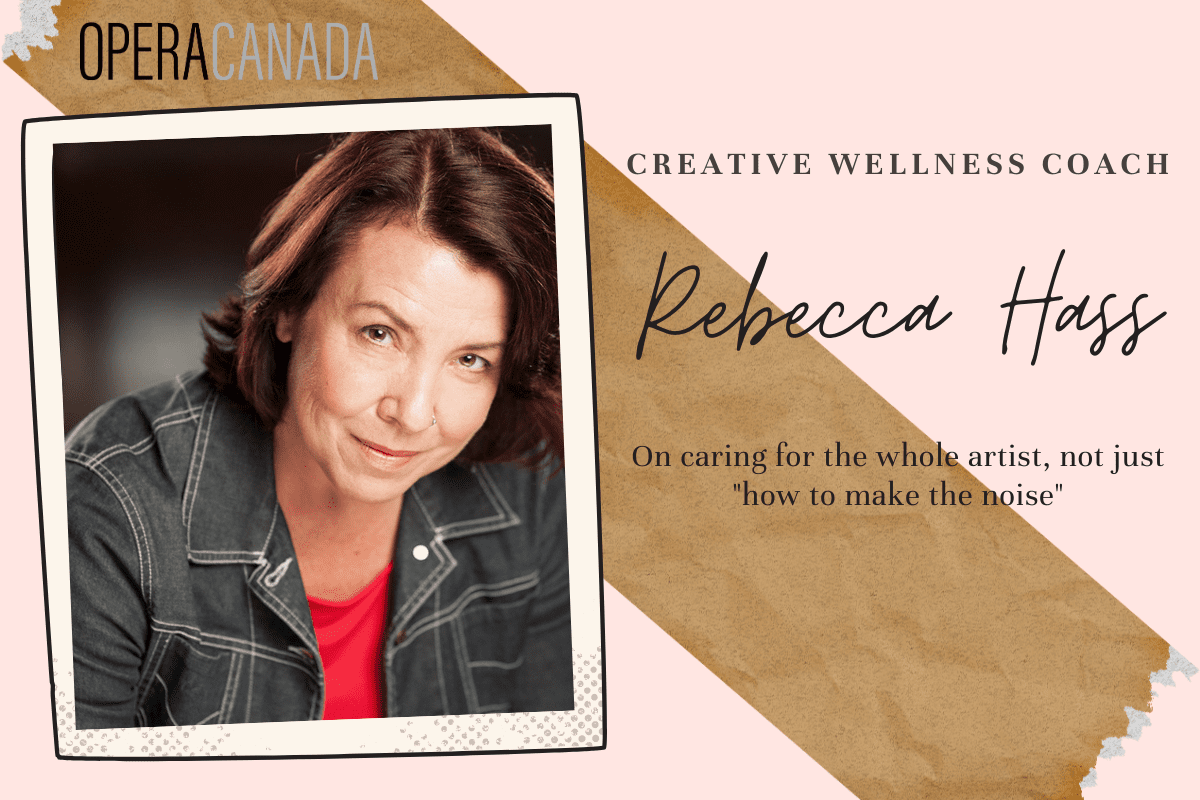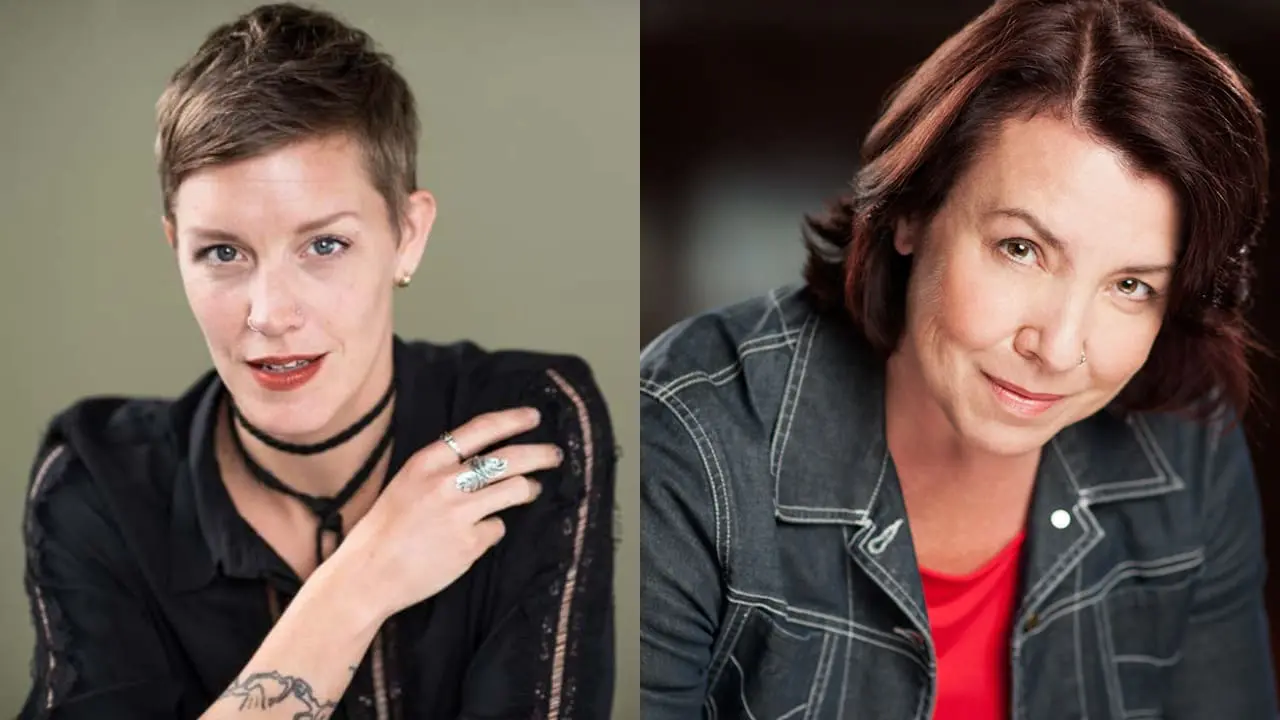In November 2020, Opera Canada magazine spoke with Rebecca Hass, mezzo-soprano and creative wellness coach, about her work with opera artists.
1. Opera artists face specific challenges that require specific solutions
Nearly 13 years into her life-coaching career, British Columbia-based Rebecca Hass–who is of Anishinaabe and Métis heritage–said she believes arts-specific wellness coaching is needed for the unique pressures that professional opera artists face.
“We talk about opera singers in some ways like elite athletes. When we describe it to people who don’t understand what it is to be a singer, we’ll say, ‘it’s like being in the Olympics,’” Hass said. “But we’re not competitive in the same way…we’re not trying to beat our opponent so our self management issues are different and our solutions are different.”
In 2005, Hass had just turned 40 when she and her husband left Toronto to remake their lives on Vancouver Island in Victoria, BC. Hass said she saw that moment as a beginning but also an ending of sorts; after singing on national and international stages Hass said she was prepared to enter the teaching phase of her career.
“I really decided that I was not going to conquer the world as a singer. I had a good career but I also had kids, and I wasn’t going to sort of go back to Europe and try and flog that,” Hass said. “So I came over here, I taught for one year at the Conservatory of Music and I quit because I was so unhappy.”
Hass said she felt, seeing what it was like to coach opera, that she could no longer ‘just’ teach young singers their craft without caring for the psychological weight they bring into a session.
2. You won’t be able to hide the emotions when you start to sing
Hass is now used to working with emerging artists in summer and university programs; she said she recalled from her own experience that a singer who is emotionally knotted up and begins to release breath in a singing lesson will stand and cry because they feel so emotionally vulnerable. So, she returns to institutions like the Canadian Opera Company’s Ensemble Studio (of which she was a member in the late ’80s) with a fresh perspective.
“It came to me all in a flash that I was interested more in the whole artist, and not just how to make the noise. It was so obvious, teaching more regularly, that when a singer comes in and is bringing all their life and their struggle, they can’t sing well,” Hass said. “It’s so hooked up into how we express ourselves.”
After a neighbour who appreciated Hass’ listening skills told her she should be a life coach, Hass went home and Googled the term. Hass also works as Pacific Opera Victoria‘s Director of Community Engagement. She said that although the life coaching field has “blossomed” over the last decade, there were few life coaching classes offered back in 2007, and definitely none that were performing arts-specific.
“It’s been kind of a bonus for me being inside the industry. We can have a shorthand quite quickly because I do know what it feels like [to] go into [an] audition and…name that voice in our head,” Hass said. “‘I suck, I’m going to fail, no one’s ever going to hire me again,’ I know all that dialogue–I lived that dialogue, what it feels like to be in those situations, or when you’re not getting work and feeling like it’s gonna [sic] last forever.”
3. Strive for work/life balance to quiet the internal ‘dialogue’
“It has always been clear to me that singers don’t need to suffer as much as they do…I don’t think I should have suffered as much as I did,” Hass said. “How many times I dug that dark hole and felt so terrible about myself because my identity was so wrapped up in my singing. I wanted to compost all of my terrible experiences and turn them into good things you can grow things in.”
Hass said a bulk of her work with young opera artists is helping them navigate a healthy work/life balance, especially in a prolonged pandemic environment when artists are missing friends, families and normal training routines.
“The conversations have really turned to ‘What is a life well lived? What do I really value?” Hass said. “My favourite question to ask–and you can apply it to any kind of artist–is ‘Why do I do this? Why do I sing? Why do I want to be a collaborative pianist? Why do I want to conduct?’
4. Live your value
Those art forms are expressions of something we value,” Hass said. “There’s many ways to live that value.”
Hass said opera singers, conductors and pianists alike get caught in the idea that a stereotypical superstar career is the only way to successfully manifest their values. Well, pandemic regulations have made it so that no one–not even superstars–can perform in the spotlight. Artists are forced to reconsider sources of creative fulfillment.
For herself, Hass said that the value she was trying to realize through singing was storytelling. When she recognized this, Hass said it felt like an “epiphany” that “freed” her: “The times when I can’t sing, I have other ways to tell stories and it’s different for each singer, what the value is that fires [them] up…Communication is a big one, storytelling is big…Community and collaborating, a lot of artists love to work together and really enjoy that rehearsal room or working on a project, or the adventure or the challenge.”
“If you can start to plug into what’s firing the urge to sing publicly, you can probably find something else in this time period that you would love as well, and you won’t feel quite as lost.”












